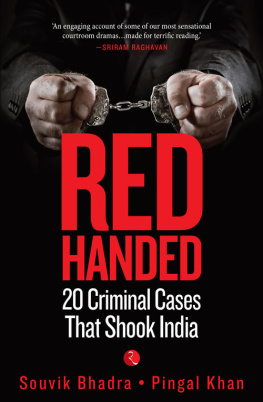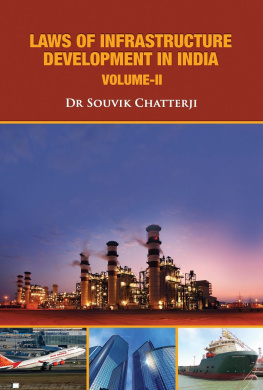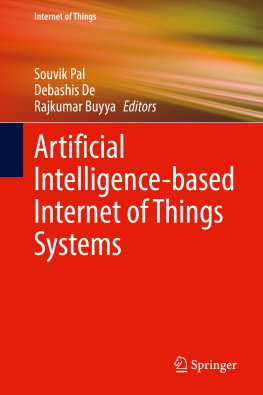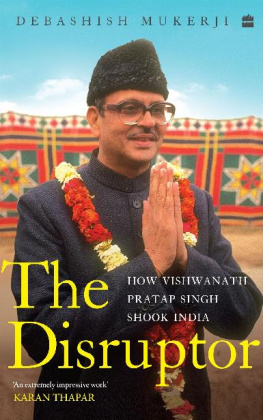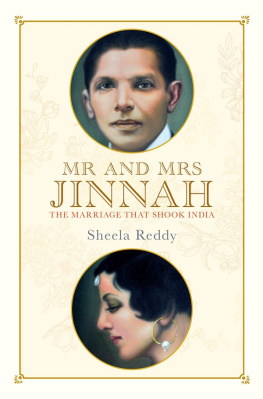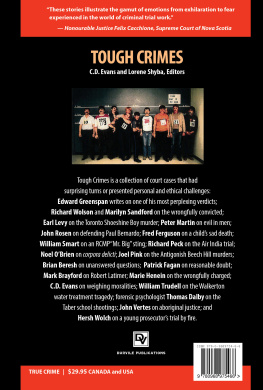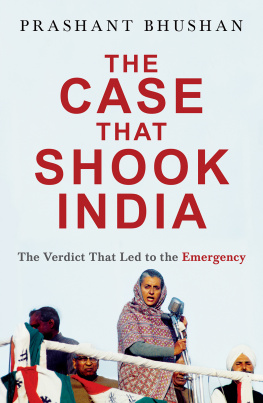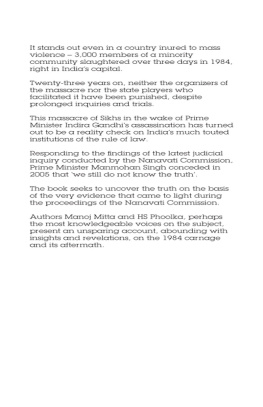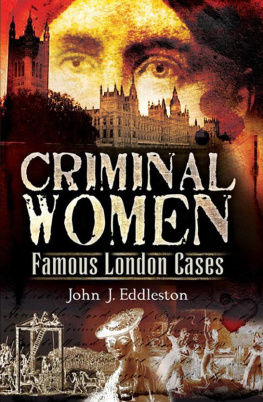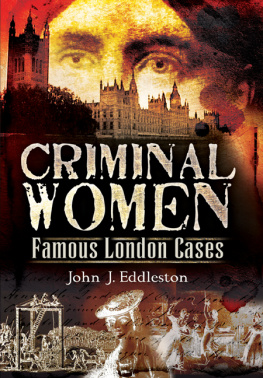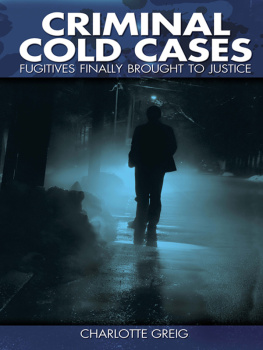Souvik Bhadra - RED-HANDED: 20 Criminal Cases That Shook India
Here you can read online Souvik Bhadra - RED-HANDED: 20 Criminal Cases That Shook India full text of the book (entire story) in english for free. Download pdf and epub, get meaning, cover and reviews about this ebook. year: 2014, publisher: Rupa Publications Private Limited, genre: Religion. Description of the work, (preface) as well as reviews are available. Best literature library LitArk.com created for fans of good reading and offers a wide selection of genres:
Romance novel
Science fiction
Adventure
Detective
Science
History
Home and family
Prose
Art
Politics
Computer
Non-fiction
Religion
Business
Children
Humor
Choose a favorite category and find really read worthwhile books. Enjoy immersion in the world of imagination, feel the emotions of the characters or learn something new for yourself, make an fascinating discovery.
- Book:RED-HANDED: 20 Criminal Cases That Shook India
- Author:
- Publisher:Rupa Publications Private Limited
- Genre:
- Year:2014
- Rating:3 / 5
- Favourites:Add to favourites
- Your mark:
- 60
- 1
- 2
- 3
- 4
- 5
RED-HANDED: 20 Criminal Cases That Shook India: summary, description and annotation
We offer to read an annotation, description, summary or preface (depends on what the author of the book "RED-HANDED: 20 Criminal Cases That Shook India" wrote himself). If you haven't found the necessary information about the book — write in the comments, we will try to find it.
RED-HANDED: 20 Criminal Cases That Shook India — read online for free the complete book (whole text) full work
Below is the text of the book, divided by pages. System saving the place of the last page read, allows you to conveniently read the book "RED-HANDED: 20 Criminal Cases That Shook India" online for free, without having to search again every time where you left off. Put a bookmark, and you can go to the page where you finished reading at any time.
Font size:
Interval:
Bookmark:

Souvik Bhadra earned his law degree from the National University of Juridical Sciences, Kolkata. He started his legal career with one of the major law firms of India and then worked as a partner at another law firm. Currently, Souvik divides his time between the Mumbai and Kolkata offices of Ashlar Law, a firm he has co-founded. He can be contacted at souvik..
Pingal Khan also earned his law degree from the National University of Juridical Sciences, Kolkata. After graduation, Pingal co-founded a full service national law firm. Subsequently, Pingal co-founded Ashlar Law with Souvik and is currently based in Bangalore. He can be reached at .

Published by
Rupa Publications India Pvt. Ltd 2014
7/16, Ansari Road, Daryaganj
New Delhi 110002
Sales Centres:
Allahabad Bengaluru Chennai
Hyderabad Jaipur Kathmandu
Kolkata Mumbai
Copyright Souvik Bhadra and Pingal Khan 2014
The views and opinions expressed in this book are the authors own and the facts are as reported by him/her which have been verified to the extent possible, and the publishers are not in any way liable for the same.
All rights reserved.
No part of this publication may be reproduced, transmitted or stored in a retrieval system, in any form or by any means, electronic, mechanical, photocopying, recording or otherwise, without the prior permission of the publisher.
First impression 2014
10 9 8 7 6 5 4 3 2 1
The moral right of the authors has been asserted.
Printed by XXXXXX
This book is sold subject to the condition that it shall not, by way of trade or otherwise, be lent, resold, hired out, or otherwise circulated, without the publishers prior consent, in any form of binding or cover other than that in which it is published.
We dedicate this book to the
late Professor Durgadas Banerjea,
for making criminal law easy, interesting and fun to learn
We also dedicate the book to
our respective parents for being who they are
Criminals do not die by the hands of the law. They die by the hands of other men.
George Bernard Shaw
IT HAS BEEN said that society prepares the crime and the criminal commits it. A criminal is born not only when a person commits an offence written down in the statute books, but also, and more importantly, because his offence is deemed a crime by the world at large. The gravity of an offence or a crime is not determined only by the amount of punishment prescribed by the law, but also by the perception of the act as a crime in the eyes of society. For example, the practice of sati continued in India for centuries in spite of it being an inhuman and deplorable act, since it was not seen as a crime as per the standards of society at the time. Even the abolition of sati and criminalizing it did not immediately end the practice because society still condoned it for years.
On the other hand, if a person is merely accused of committing a crime, or if strong suspicion is cast upon him, it is enough to create a strong enough impression on society to brand the individual as a criminal for life. During the British rule, ethnic and social communities in India which were defined as habitually criminal were systematically registered by the government. Restrictions on their movements were also imposed and adult male members of such groups were forced to report weekly to the local police. These criminal tribes were de-notified after India gained independence. However, branding them as criminal tribes for over a century has led to discrimination and stereotyping even today, by society, the police and the media.
The role played by the media in the criminal justice scenario in India cannot be ignored. In the past few decades, extraneous circumstances have begun affecting decision-making in a criminal trial. The reactions of society to major crimes being committed within India is, of late, being moulded by the media to a great extent. Whenever a major crime like a murder or a rape takes place, within moments, the entire story is played out (and often dramatized) across news channels and is splashed all over the next days newspapers. In India, trial by media, i.e., the declaration of innocence or guilt of the accused by television news and newspapers before or after a verdict in a court of law, has assumed much significance. As a majority of the Indian population is largely dependent on it for information, the influence that the media has on people is considerable. During high-profile court cases, the media is often accused of provoking an atmosphere of public hysteria that not only renders a fair trial nearly impossible, but also ensures that, regardless of the trials result, the accused will have to live the rest of their lives under intense public scrutiny. On the other hand, it may be argued that the opinions of the public are formed independently and that the media merely voices them.
The media finds its defence under Article 19(1)(a) of the Constitution of India, which protects the fundamental right to freedom of speech, which has the right to know inherent in it. However, the central government is considering the Law Commissions 200th report, titled Trial by Media, which recommends an amendment to contempt of court laws, empowering the judiciary to impose restrictions on media reporting so as to curb possible interference in the administration of justice, protect fair trial and ensure the rights of the accused. The former Attorney General of India, late G.E. Vahanvati, had mentioned on 28 March 2012 that the government was actively considering these recommendations and seeking response from the state governments for preparing a draft law on the issue.
The Law Commission, when headed by Justice M. Jagannadha Rao back in 2006, had spoken of a need to empower the courts to pass postponement orders to regulate publication. Meanwhile, though courts have held that the conditions for passing such orders of prior restraint should be allowed only under special circumstances, it is, however, accepted by the Supreme Court of India time and again that temporary postponement of publication can be passed. This is, in fact, a norm in several jurisdictions around the globe, such as the United Kingdom, Australia, etc. It was added that publication of material prejudicial to the person after his arrest relating to his character, prior convictions and alleged confessions would also result in contempt of court. The justification given by the government of India was that the right to freedom of speech is for the benefit of the public and not the media.
Trial by media in India has had a significant positive influence in seeking justice in several instances as well. Some famous criminal cases where the accused who were ultimately convicted would have otherwise gone unpunished had it not been for the intervention of the media are the Priyadarshini Mattoo case, the Jessica Lal case and the Nitish Katara murder case.
In the Jessica Lal case, for instance, the acquittal of the accused by the trial judge due to insufficient evidence and witnesses turning hostile led to public outcry. Both the national and international media highlighted this case as an instance of the skewed judicial process in India, which is often unduly influenced by the rich and powerful. As the public movement gathered momentum, the Delhi police approached the High Court to review of the case. This activism also helped shed light on an older casethat of Priyadarshini Mattoowhich had also been pending in the High Court. Human rights activists and the media took up the cause of that case too, and in light of this attention, the Delhi High Court took an unprecedented step and conducted a day-to-day hearing of the case and delivered its judgment in little over a month, convicting the accused.
Font size:
Interval:
Bookmark:
Similar books «RED-HANDED: 20 Criminal Cases That Shook India»
Look at similar books to RED-HANDED: 20 Criminal Cases That Shook India. We have selected literature similar in name and meaning in the hope of providing readers with more options to find new, interesting, not yet read works.
Discussion, reviews of the book RED-HANDED: 20 Criminal Cases That Shook India and just readers' own opinions. Leave your comments, write what you think about the work, its meaning or the main characters. Specify what exactly you liked and what you didn't like, and why you think so.

